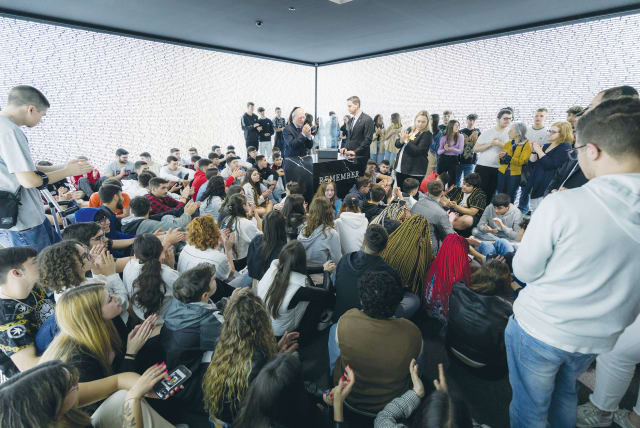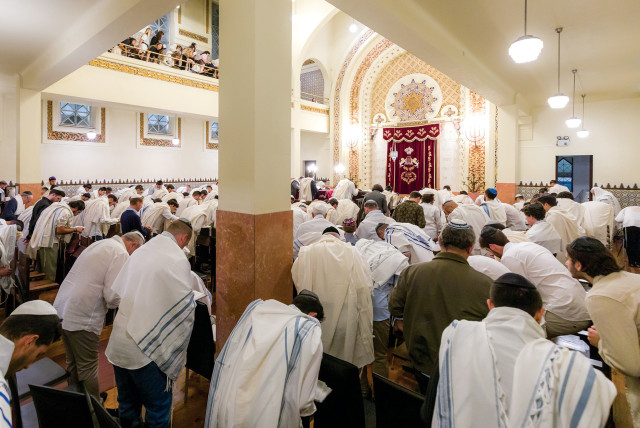Porto is an example for reestablishing a Jewish community - opinion

We must find new and innovative ways of ensuring Jewish existence in all parts of our continent for generations to come.
‘If you build it, they will come,” were the immortal words spoken to Kevin Costner’s character in the 1989 blockbuster Hollywood film Field of Dreams.
For many months and years, we have been hearing about the death or demise of smaller Jewish communities around the world, and while developments appear to be moving in a challenging direction, I am proud to say that one community is bucking the trend.
The Porto Jewish community has grown hundreds of percent in recent years, thanks to a policy of progress, development and growth.
While many of our Jewish communities believe that dwindling numbers of Jews require fewer services and institutions, our Porto community decided to take the opposite strategy.
Jews in Porto are flourishing
Thanks to donations from community members and funds received from the Sephardic citizenship law, providing the potential for Portuguese citizenship to Sephardim, we have built Achdut Centers, educational facilities, a cemetery, and opened a mikveh (ritual bath) and kosher restaurants.
This is all on top of constantly refurbishing and expanding our historic Kadoorie Mekor Haim Synagogue.
All of this has led to a rapid expansion of the Jewish presence in Porto and an increase in Jewish tourism in the area.
Jews come from all over the world to live in our community or visit it, because it provides an enhanced and flourishing Jewish existence.
Moreover, we are educating our non-Jewish neighbors in Porto and across Portugal about Judaism, Jewish history and heritage. We hold regular school visits for thousands of children at our Jewish and Holocaust Museum, and, of course, our synagogue.
Over 100,000 teenagers have visited our Holocaust Museum in just the last two years, almost 10% of all youths in the country.
These visits are helping to create a greater understanding and appreciation of Judaism that was formally banned from our country for hundreds of years.
All of this has been achieved despite great odds.
Jewish presence in Portugal was kept secret over centuries
For hundreds of years, the Jewish presence in our country, which was previously rife with Jewish history, contribution and civilization, was largely kept underground and spoken about in whispered corners.
It took the bravery and audacity of a high-ranking Portuguese military officer named Artur Carlos de Barros Basto to reestablish what had long been dormant.
Around a century ago, Captain Barros Basto, believing he had Jewish roots, decided to convert to Judaism.
In 1923, along with a handful of Ashkenazi Jews who resided in the city but were largely unaffiliated, they formally registered the Jewish Community of the Porto and the Israelite Theological Center in the City Council of Porto.
THE GROWING community aroused the interest of descendants of Jews in the surrounding areas who had kept their origins, prayers and traditions a closely guarded secret for centuries, and Basto tried to help some to convert and helped the men be circumcised with medical assistance.
These types of acts aroused significant opposition amongst the Portuguese authorities who stripped him of his rank and threw him out of the army, despite his role in the establishment of the Portuguese Republic and his bravery during World War I.
However, despite the overwhelming pressure, Basto would not be dissuaded from his sense of purpose in rebuilding Jewish life in Porto.
Despite repeated attempts at officially rehabilitating the “Portuguese Dreyfus’, led by his granddaughter Isabel Ferreira Lopes, granddaughter of Basto and vice president of the Jewish Community of Porto, the state has still not posthumously reinstated the captain.
Regardless of this ongoing battle, Basto’s vision of a thriving Jewish community in Porto has been fulfilled.
The captain’s efforts to first build the institutions and then the community have guided us to this very day, and the efforts, numbers and successes speak for themselves.
Europe's Jews learn from the Porto community
However, we would like our achievements to be replicated elsewhere.
As the Talmud dictates “Kol Yisrael arevim zeh bazeh,” meaning all of Israel are responsible for each other.
Only a few days ago, tens of Jewish community leaders from across Europe came to Porto and took part in a conference led by the European Jewish Association to learn about how to rebuild and expand diminishing Jewish communities.
We hope that our story has imbued passion and optimism across the continent and beyond.
Our people’s motto is Am Yisrael Chai, the Jewish People Live!
We must not and dare not accept the idea of dying Jewish communities as a fait accompli.
We must find new and innovative ways of ensuring Jewish existence in all parts of our continent for generations to come.
Our model is the biblical Nachshon who jumped into the Sea of Reeds first while others were busy declaring “We do not want to be the first to jump into the sea.”
Basto was our Nachshon. He acted and initiated and his bravery and certitude in his mission created the history that we are all living in today.
His story continues to be our inspiration and we constantly hear him proverbially whispering in our ears that “If you build it, they will come.” And he is right.
The writer is president of the Porto Jewish community. You can watch the remarkable story of Captain Barros Basto and the re-establishment of the Jewish Community of Porto in Sefarad: The Movie. www.sefaradmovie.com
Jerusalem Post Store
`; document.getElementById("linkPremium").innerHTML = cont; var divWithLink = document.getElementById("premium-link"); if (divWithLink !== null && divWithLink !== 'undefined') { divWithLink.style.border = "solid 1px #cb0f3e"; divWithLink.style.textAlign = "center"; divWithLink.style.marginBottom = "15px"; divWithLink.style.marginTop = "15px"; divWithLink.style.width = "100%"; divWithLink.style.backgroundColor = "#122952"; divWithLink.style.color = "#ffffff"; divWithLink.style.lineHeight = "1.5"; } } (function (v, i) { });

